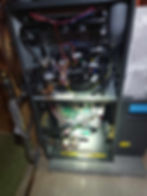Home Winterization Tips for Homeowners
- fred8380
- Dec 13, 2024
- 3 min read
Winter in Southern Ontario can be harsh, with snow, ice, and freezing temperatures testing your home’s resilience. Proper winterization is essential to protect your property, conserve energy, and maintain comfort. Here’s a detailed guide to preparing your home for the cold season.
Download our free Home Winterization Tips in PDF here.
Building Envelope
Leaky window frames, door frames, and electrical outlets can let warm air escape, increasing energy costs and discomfort.
Check for Air Leaks: Use your hand or an incense stick to detect drafts around windows and doors. On breezy days, walk through your house to identify less obvious leaks, particularly where building materials join.
Seal Leaks: Apply caulk or insulation tape to seal gaps. Proper sealing prevents cold air infiltration and heat loss.

Insulation
Adequate insulation is key to retaining warmth.
Attic Insulation: Since heat rises, your attic acts like your home’s winter hat. Ensure your attic is properly insulated, typically at least 12 inches thick depending on the insulation rating.
Storm Doors and Windows: Installing these adds a layer of protection against cold and wind.

Heating System
Your heating system needs to perform reliably throughout winter. True story - our furnace died about 2 days before Christmas one year and you do NOT want to be frantically trying to find an HVAC technician after you already are living without heat AND during the holidays!
Test the Furnace: Raise the thermostat to ensure your furnace responds promptly.
Replace Filters: Change the air filter every season for optimal performance.
Check Fuel Levels: Ensure oil or propane tanks are full if this is how your home is heated.

Cooling System
Prepare cooling systems for winter to avoid damage.
Clean Outdoor Units: Remove debris and cover units with breathable, waterproof covers.
Store Window Air Conditioners: Remove and store them to prevent cold air leaks and component damage.
Reverse Ceiling Fans: Set fans to spin clockwise to circulate warm air.

Plumbing System
Frozen pipes can cause costly damage. Protect your plumbing system.
Insulate Pipes: Use foam or fiberglass insulation on exposed pipes in unheated areas like garages, attics and crawlspaces.
Shut Off Exterior Water: Turn off the water supply to exterior faucets and drain them.
Winterize Sprinklers: Drain and purge systems with compressed air.
Consider Plastic Plumbing: Plastic is more tolerant of cold expansion than copper or steel. Houses located in colder climates might benefit from the exclusive use of approved plastic plumbing.
Maintain a Decent Indoor Temperature: Homeowners should be aware that much of the plumbing system travels through areas that are significantly colder than the rest of the house. Because it is impossible to monitor the temperature of every portion of the plumbing system, indoor air temperature should be kept high enough throughout the winter to keep pipes in any unheated places from freezing.

Chimney and Fireplace
Ensure your fireplace and chimney are safe and efficient.
Inspect for Pests: Your chimney should have a spark arrestor installed which will help prevent nesting animals, but if not, check your chimney for critters. (My wife is likely still traumatized from the year "Flappy" flew down the chimney and crashed straight into her.)
Clean the Chimney: Hire a professional if it hasn’t been cleaned in years.
Close the Damper: Prevent warm air from escaping when the fireplace isn’t in use.
Install Glass Doors: These can be added to fireplaces and wood stoves to provide an added layer of insulation.
Roof and Gutters
Your roof and gutters bear the brunt of winter weather.
Clear Debris: Remove leaves and pine needles to prevent ice dams and water infiltration.
Replace Missing Shingles: Ensure your roof is in top condition before the weather turns bad.

Landscaping
Protect outdoor features from winter damage.
Cover Furniture: Use covers to shield patio furniture.
Seal Decks: Apply a protective sealant to your deck, if you think it needs another coat.
Wrap or tent plants: Not all plants in your garden can withstand the harsh winters. If needed, you can use burlap to wrap or tent these plants to help protect them.

Winterizing an Unoccupied Home
Vacant homes need extra care to avoid winter damage.
Drain Plumbing Systems: Empty pipes, faucets, and tanks by shutting them off at the shut-offs and leaving the faucets open. Add antifreeze to toilets.
Shut Off Electricity: Unplug appliances or shut off the main breaker if possible.

Proper winterization is vital for safeguarding your home. For more expert tips, download our free Home Winterization Tips here.
Stay warm, save energy, and keep your home safe this winter with these practical tips from Leppard Inspections!


